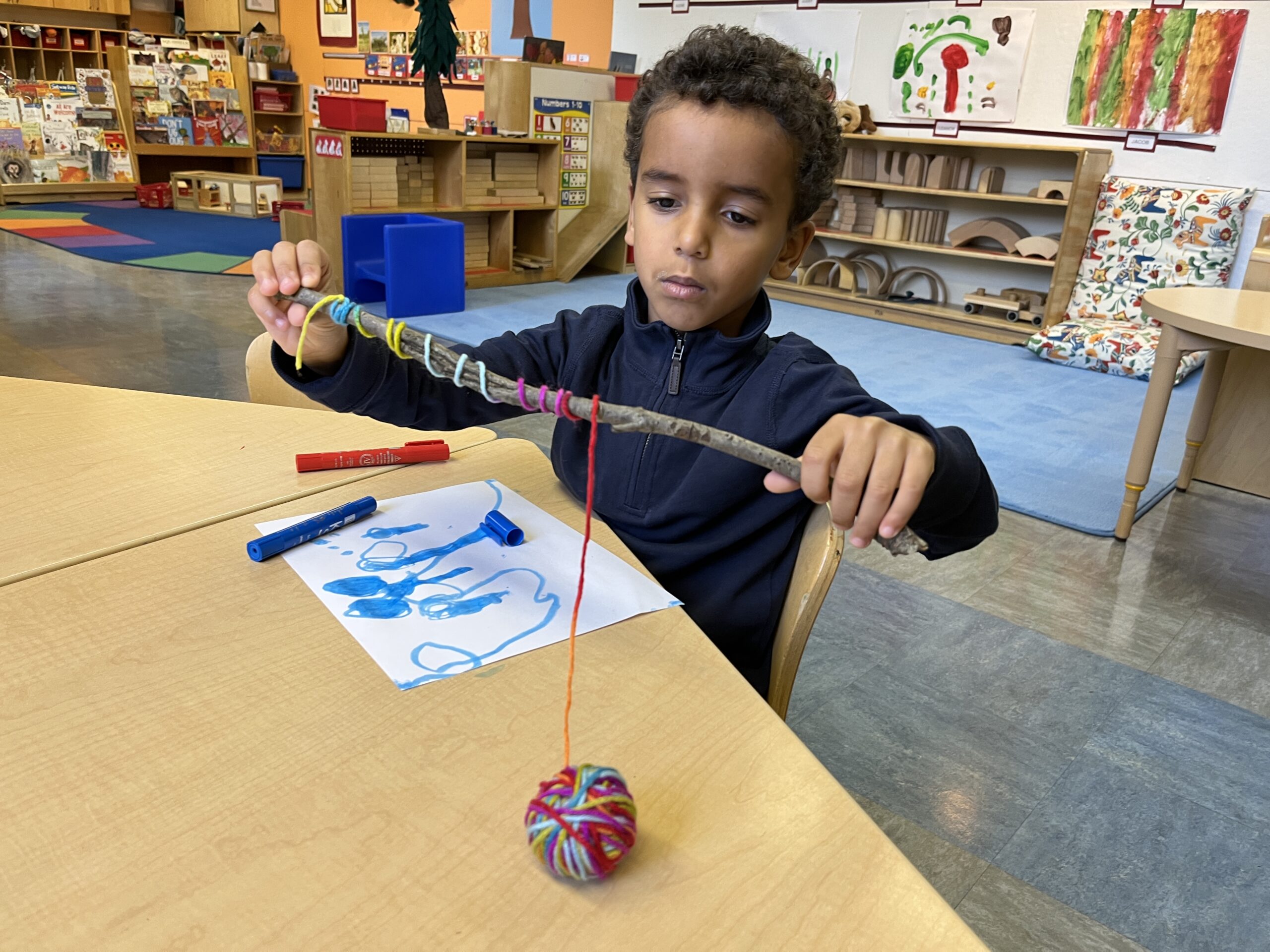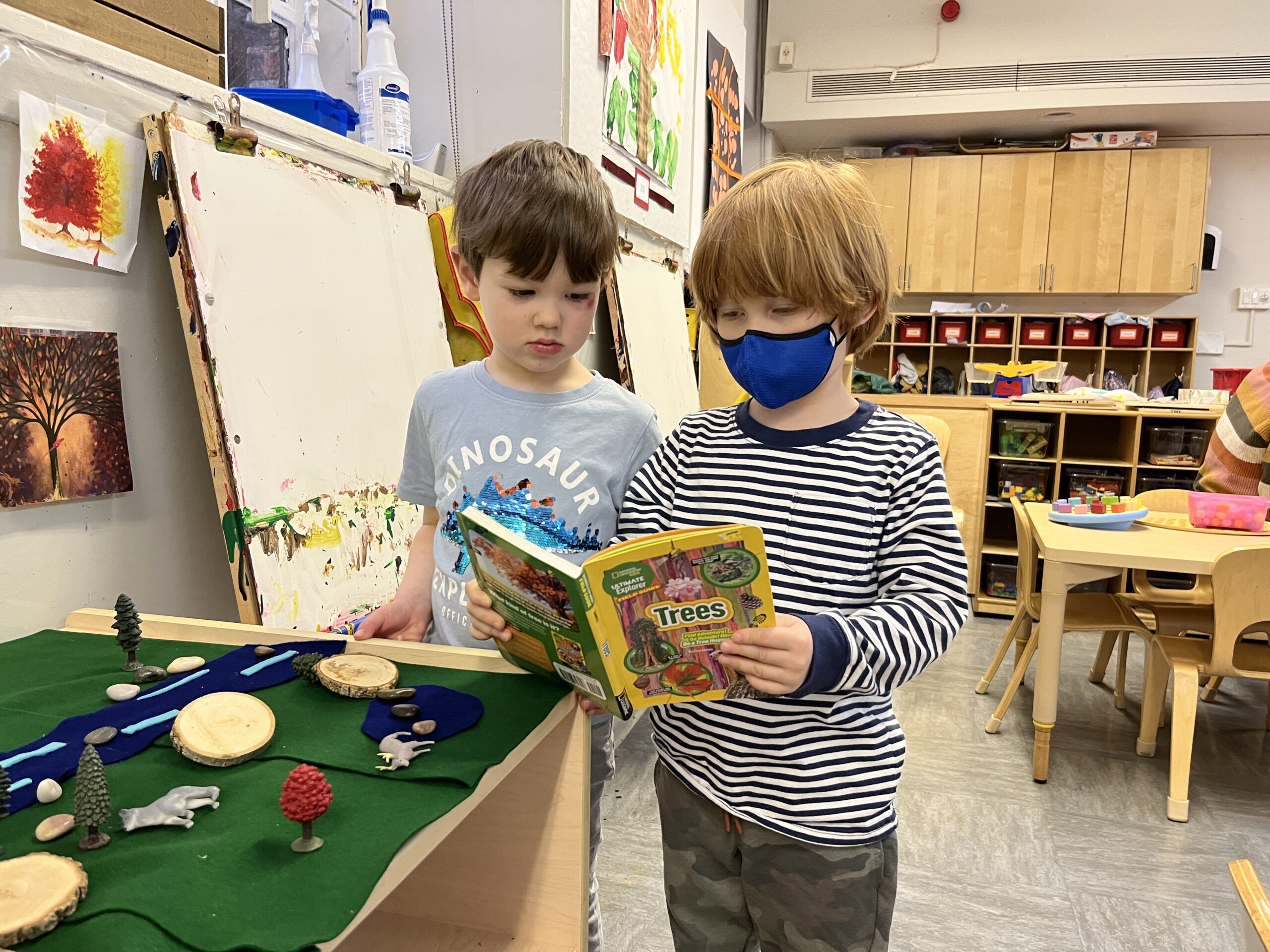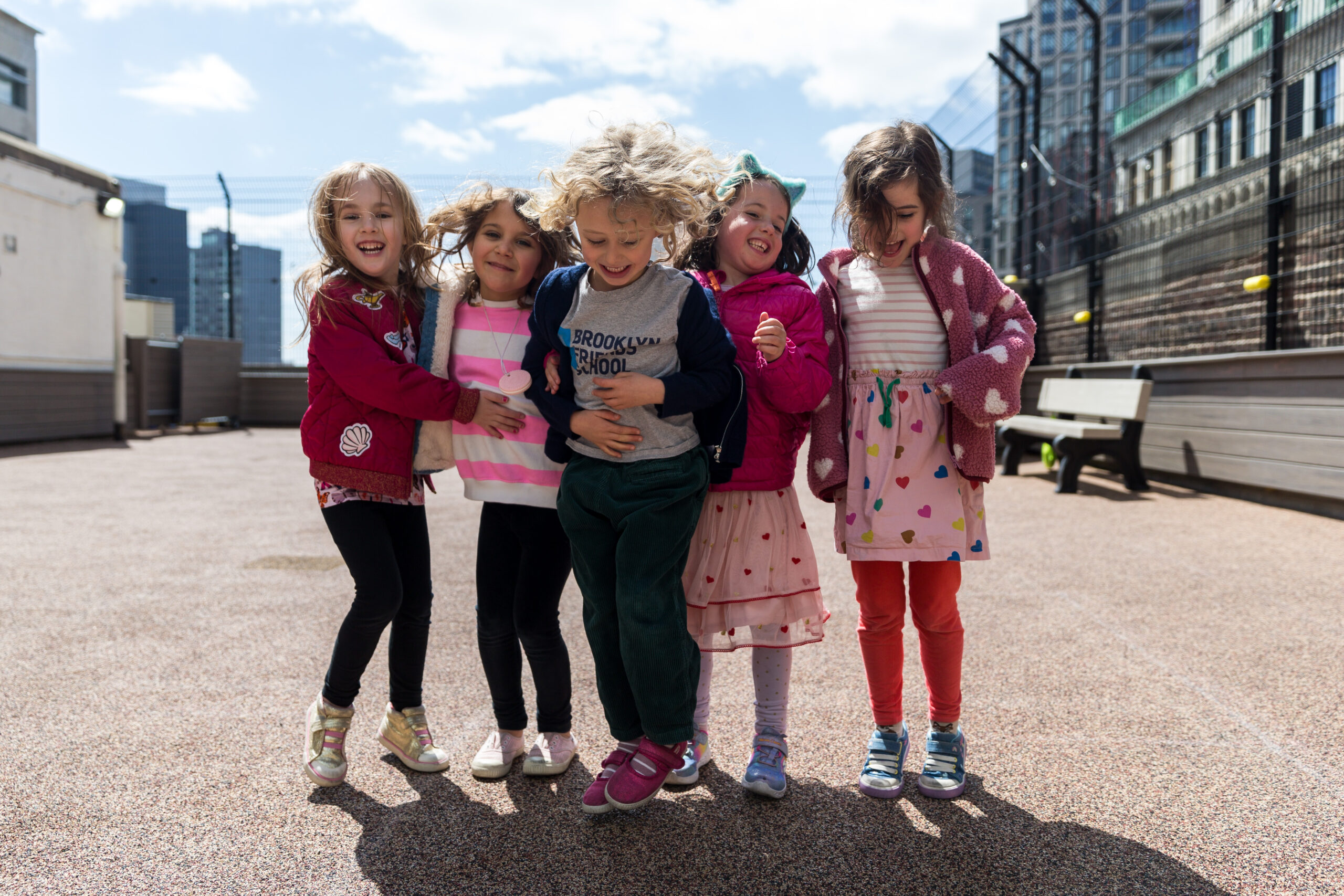The Preschool Curriculum
Emerging Literacy
From the time they are born, children are acquiring language, learning to listen and are inspired to tell stories. Soon they begin to recognize that written symbols can have meaning and are used as a method of communication. Preschool students are encouraged to express themselves and build vocabulary by being read to, looking at books, and conversing during circle and activity times. Trips to the library to hear a story and choose a book occur on a regular basis. Children also write in journals, tell “Small World” stories based on play scenarios, and dictate storylines that emerge from artwork and play materials.
Language is valued as a means to resolve problems and issues in the classroom. Children learn to navigate their environment as they develop and use their language skills.
Teachers monitor and guide each child to ensure the development of the following skills as they play and explore:
- Visual discrimination
- Auditory discrimination
- Memory
- Sorting, matching – recognizing differences and commonalities
- Sequencing – logical order
- Use of oral language
- Ability to answer questions and follow verbal directions
- Ability to remember previous events and apply that information
Mathematics
Mathematics is a way of ordering and thinking about the world; it is much more than learning to count and to read and write numbers. As soon as a child thinks of himself or herself (one) and others (more than one), the child begins to understand and learn math. Mathematical concepts develop through the hands-on use of manipulatives, puzzles, and blocks so that children discover and explore early math principles through play.
When children are building in the block area, playing with sand, setting the table, taking only two crackers for snack, or following a recipe chart, they are developing mathematical skills and concepts, including:
- Sequencing
- Matching
- Sorting and grouping
- Patterns – creating and noticing them
- One-to-one correspondence
- Part/whole relationships
- Spatial relationships
- Number concepts
- Collecting and comparing data
Science
Science in the Preschool is the joyful experience of hands-on investigation, exploration, experimentation and discovery. Children develop an awareness of the changing world. They learn by engaging in activities such as observing grass grow, raising composting worms, watching butterflies emerge from their chrysalises, collecting leaves and identifying trees or researching the night sky.
Preschool science study consists of concrete experiences. Children observe growth in nature and in themselves and others, and follow seasonal changes. When children cook or bring snow into the room and watch it melt, they are gaining an understanding of changes and properties. Activities include using magnets, color wheels, and magnifying glasses. The Fours take neighborhood walks outside to experience seasonal changes first-hand, and take “deep dives” into learning about various science topics. “Deep dives” have included studies about space and astronauts, nocturnal animals, transportation, wild cats and more!
Social Studies
The social studies curriculum allows preschoolers to explore and understand their immediate environment. Children begin a journey of discovery as they learn about their classroom community. They learn the community’s routines, rhythms, and rules, and begin to understand how to function as a group.
There are many ways in which preschoolers notice and discover the wonderful differences and common threads that bind individuals together. In the classroom setting teachers, families, and students share their backgrounds in all the ways they are diverse – age, culture, family structure, race, gender, learning style and more. They explore family traditions, holidays, stories and cultural roots by cooking a variety of recipes from around the world, reading books, listening to an array of music, and dancing.
Threes classrooms incorporate a Family Traditions Curriculum in their program. Families share a tradition which is defined as anything you do more than once with the people you love. The Traditions Curriculum creates a bridge between home and school. It provides an opportunity for sharing identities of families, presents diversity in the ways we live, gives children a voice, creates community and allows children to celebrate one another. Through these activities, the children learn to acknowledge the differences they notice, and to gain respect for and acceptance of a variety of ideas and opinions.
After children become comfortable in their own classroom, they are introduced to the wider school community: interacting with students in other Divisions through Lower School and Middle School Buddy Time, shared projects with Upper School’s student-led Environmental Action group, watching performances by other classes, and participating in school-wide events such as the spring art show.
As part of their educational program, the children learn what a community is, what it means to be part of that community, and begin to understand their roles in serving their classroom. In addition they begin to find ways to serve the community outside school. For example, caring for our “Greenie” aeroponic garden provides a way for the children to steward and care for plants and learn about nature. The seeds and foundation for Service Learning are planted through our early childhood social-emotional curriculum as our preschoolers learn to share and care for one another. Preschool children and families also participate in age-appropriate, meaningful responses to current events and social justice issues in coordination and in conjunction with school-wide service learning initiatives. For example, children may work with their older Buddies (COVID regulations permitting), decide to take action as a class in response to something they deem unfair, or read a book or have a conversation about a particular query as a means to further expand their understanding of how we are all “change-makers” and have a voice.
Visual Arts
Creating, experimenting and learning go hand in hand. Art is a form of communication that comes naturally to children. It is experiential and exploratory and does not need to be planned or purposeful. Students have opportunities to be creative every day, using a variety of materials including paint, markers and crayons, and collage. Art activities develop the following skills:
- Fine motor coordination
- Awareness of color, shape, size, and texture
- Understanding of spatial relationships
- Awareness and understanding that symbols have meaning
- Self-expression
Music
Classes engage in musical activities daily, and a music specialist works with classes on enhancing music skills on a weekly basis. Children sing or play rhythm instruments during circle time and listen to the music of varied styles and cultures. As children sing, perform finger plays, or imitate animals in a song, they use their imagination, strengthen their memory and language skills, and improve their coordination. They develop an appreciation for the patterns and the musical variety produced by rhythms and melodies. Also important at this age, they learn to love music and find enjoyment in singing together. In addition, all the children and teachers participate in a weekly All-Preschool group sing-along.
Dramatic Play
Dramatic play allows children many opportunities to grow socially and emotionally as they use their imaginations in a variety of ways: in the house area, the block area, with a basket of small figures, through the simple act of draping a colored scarf, or by playing on the rooftop playground. It is here that children, in a safe, supportive environment with the guidance of teachers, can:
- Encourage the use of rich expressive language
- Imitate the adults in their world
- Reenact real-life situations
- Explore reading and writing as they play
- Reflect the relationships and experiences in their lives
- Express their needs
- Release unacceptable impulses in a safe way
- Reverse the roles usually taken
- Learn to develop and expand narratives
- Problem-solve and experiment with solutions
- Learn to symbolize- i.e. a banana can be a telephone
Large Motor Play
On the roof and in the gymnasium children are developing an awareness of their bodies in space. The ability to move with skill, care, thought, and imagination is a learning process for children as they gain control of their own bodies. On the rooftop playground or in the gym, children have the opportunity to run, jump, climb, play with balls, build with “Blue Blocks”, ride bikes, and move with freedom.
Dance
Preschool students explore the elements of dance through story and song while developing body awareness and large motor skills. Weekly dance classes include a variety of themes for exploration and imagination. Each theme generates a sequence of actions and qualities of movement. Classroom studies of weather, space, animals and holidays make their way into the dance room with creative movement investigations in which children may scamper like squirrels, swirl and fall like snow, hatch like chicks, or dance with red ribbons for the Lunar New Year.



